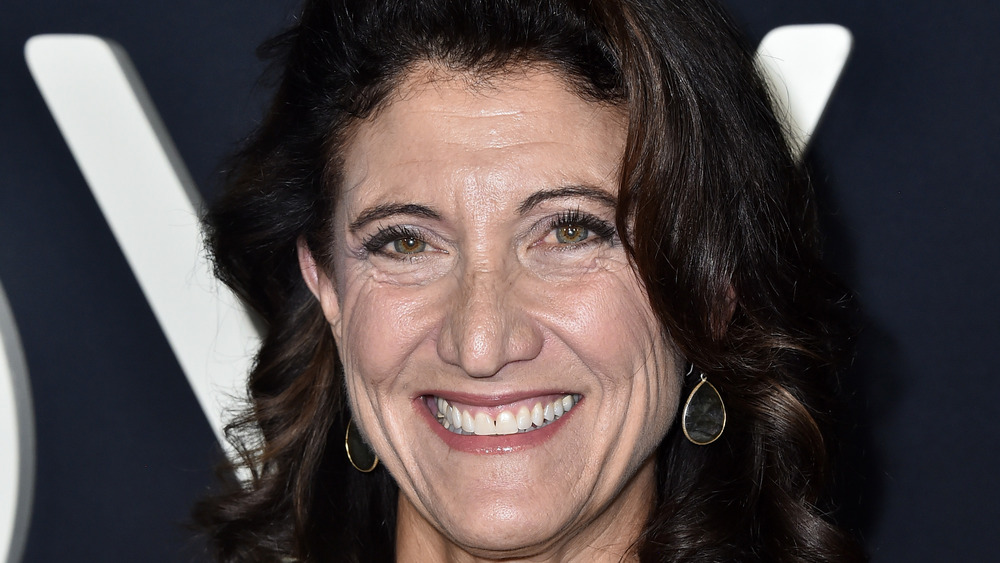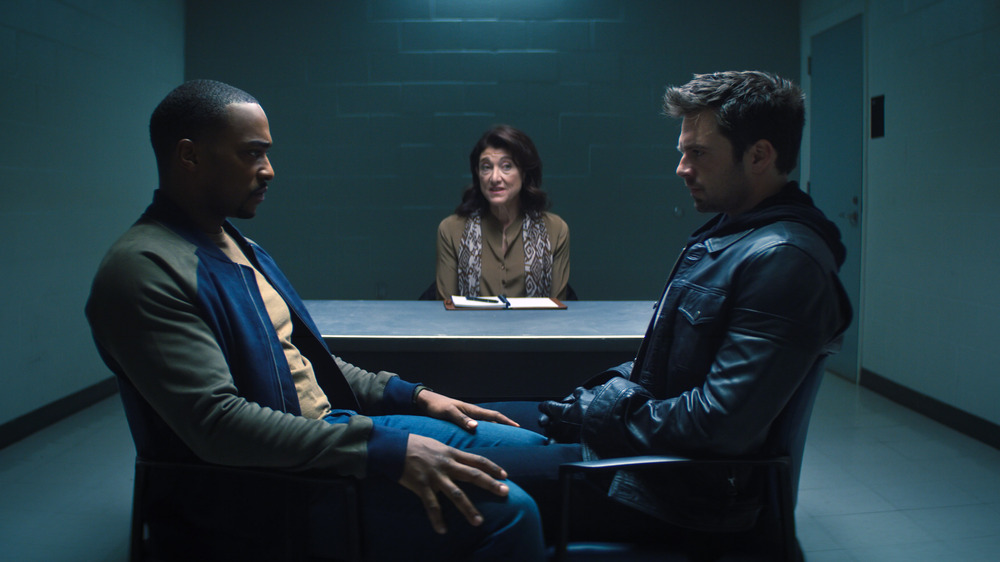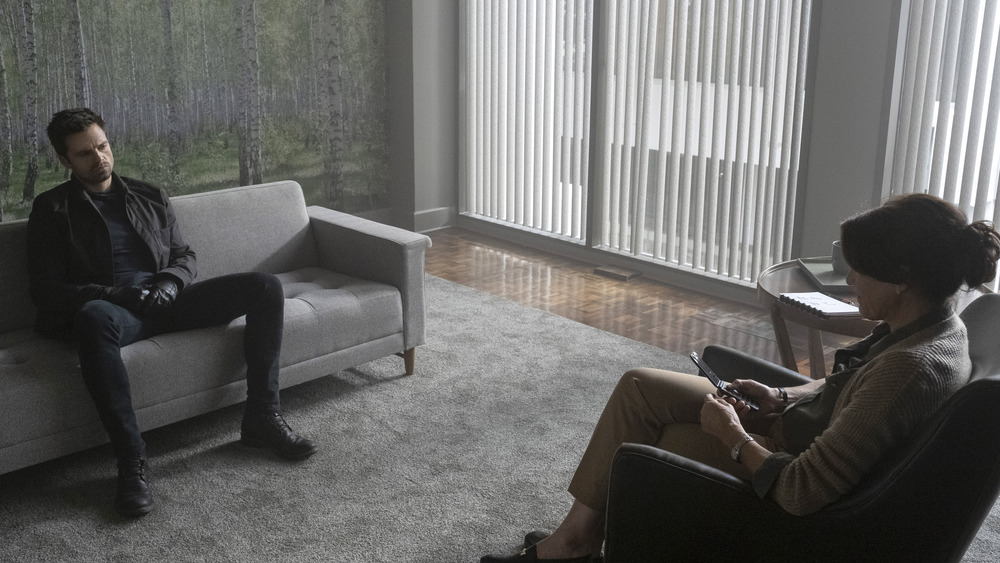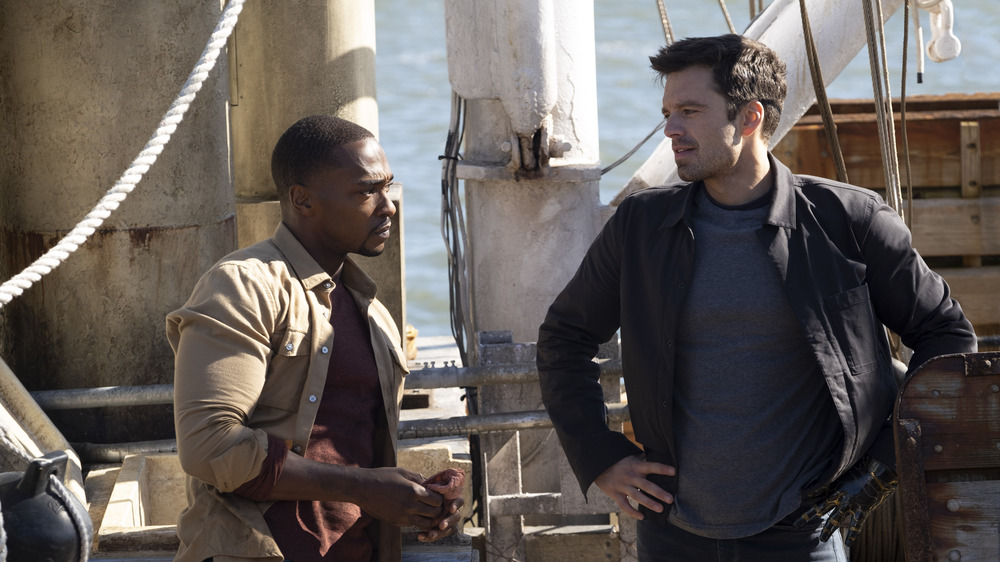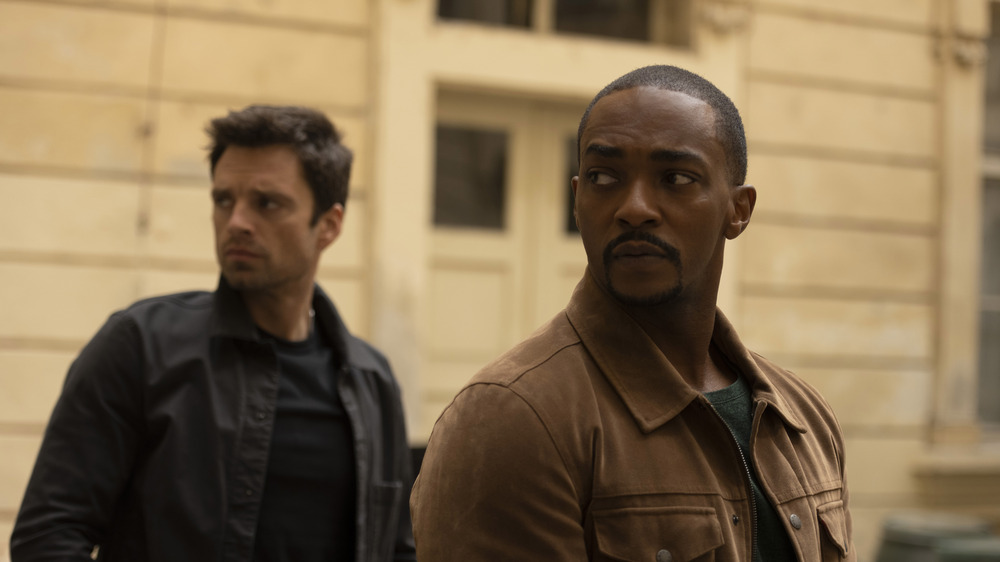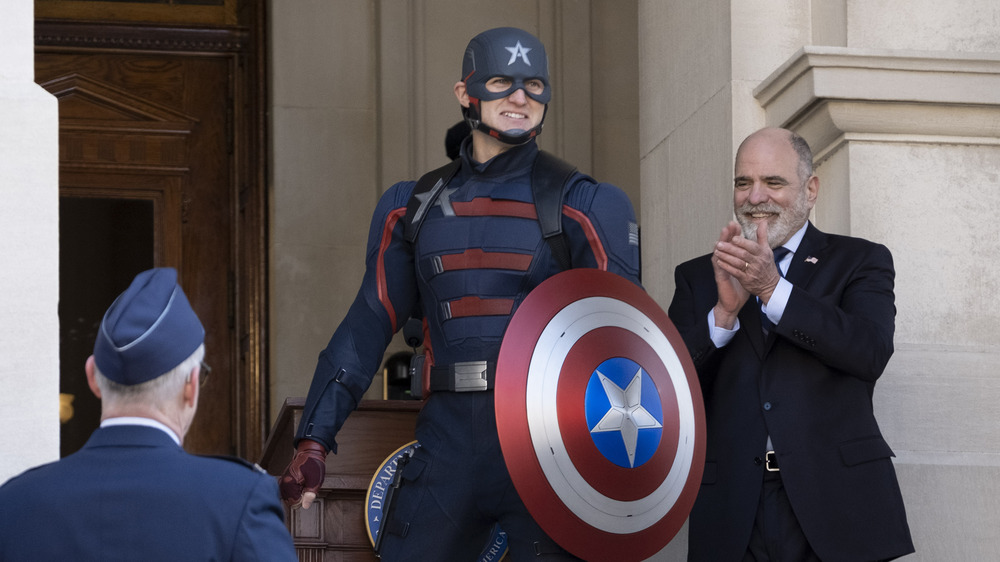Falcon And The Winter Soldier's Amy Aquino Tells Us Which Avengers Need A Psychologist And More - Exclusive Interview
We all know Amy Aquino from her appearances as The Falcon and the Winter Soldier's Dr. Raynor — a.k.a. Bucky's therapist. But where was the good doctor before she landed a role on the hit Disney+ series that focuses on the adventures of Sam Wilson and Bucky Barnes? Aquino is no stranger to Hollywood, with a hefty list of credits of everything from hit TV shows to blockbuster films.
Between stints on popular shows like Freaks and Geeks, Picket Fences, The Finder, Prison Break, Glee, and Bosch, Aquino is definitely a TV veteran. The Falcon and the Winter Soldier isn't her first stint as a doctor, either. Aquino played Dr. Janet Coburn on ER for 26 episodes — and she proved she could play a psychologist as Dr. Toni Pavone on Felicity before The Falcon and the Winter Soldier was ever a blip on the radar. Aquino's previous roles don't stop at the TV screen, either. With parts in films such as White Oleander, The Lazarus Effect, and Working Girl, Aquino has been busy making a name for herself in Hollywood since the '80s.
Looper had the chance to speak with Aquino during an exclusive interview where she opened up about the importance of Bucky's therapy arc, Anthony Mackie and Sebastian Stan's on-set shenanigans, and which Avengers need a visit from Dr. Raynor.
Couples therapy with Sam and Bucky
What was it like working with Anthony Mackie and Sebastian Stan?
They were lovely. We had not had a chance to meet beforehand, and they could not have been sweeter, more welcoming, or more helpful. And then they were just delightful and funny. And watching them together, for Amy, was super fun. And for the actress, just super easy because it just made it very easy for me. ... They were so naturally, so completely and thoroughly present. They have all this history already and just put it right out there. So I just got to go with the flow.
That's awesome. Knowing Anthony and Sebastian, I imagine the double therapy session led to a lot of shenanigans — especially when they had to get super close for some light gazing. How long did it take to get the final product of that scene, and did the guys have any funny outtakes?
I'm trying to remember the... There was nothing but funny outtakes. The biggest challenge of the couples therapy scene was knowing at what point I should interject and stop it because they were just improvising like crazy and on each other, and it was all this delightful stuff. But at some point, we did need to get to the rest of the scene. So I'm trying to remember if Kari Skogland gave me a signal that this is when I should stop or if she just ...
She's an amazing director and knows when to kind of let things go and let the actors take control of things. But that was the big challenge. It was like, all right, just how much of this should we let go on before Dr. Raynor says, no, no, no. Because Dr. Raynor is kind of enjoying it. [Laughs]
Moving past the therapy stigma
That's so funny. Can you think of anything specific that happened, or is it sort of all a blur?
Oh gosh, it was so long ago. This is all pre-pandemic, and it was one day, and I flew in for it. So... no.
People tend to stigmatize therapy as if it's not something that everyone can't benefit from — even though anyone can benefit from therapy. So how do you think it's helping Bucky? And what would you say to the skeptics who don't agree with it?
I think that what's great about what Marvel is doing in putting Bucky into therapy is acknowledging that none of this happens in a vacuum — that when you're a soldier, whether you've had Hydra do nasty things to you or you're just a soldier and you're being sent out and expected to shoot at people and kill them, that you're still a person and that still takes a toll on you. And we see it with our veterans now, with this horrific war, where we're finally acknowledging that it's there.
When you've been through trauma, oftentimes, you need help.
If anybody needs help with what they've been forced to do against their will... I mean, it's bad enough — he's had to kill people that he knew needed to die, or aliens or whatever — but when he's had to do this, and he knows he's caused so much pain and he didn't have control over it, but he still was in himself doing it, and he has memories of it. That's huge.
I mean, if he didn't get therapy, he would probably be dead, as so many of our vets ended up being. I'm a big proponent of therapy. And I think it's very, very valuable that Marvel is presenting this as just... it's a mental health problem. A mental health problem is like a physical health problem. You've got the problem and you deal with it. It's nothing to be embarrassed about it. You're not embarrassed about going to get stitches if you get a cut on your hand. Do it.
It's so important.
For anyone interested in seeking therapy, these resources can help.
Deciding who they want to be
Isaiah angrily asks Bucky, "You think you can wake up and decide who you want to be?" But this question is so relevant in this series because that's exactly what Bucky and Sam are doing. As we learn more about their backstories, they're deciding who they are in this moment while confronting their respective trauma. And it's a beautiful thing. What's your viewpoint on these character arcs, and how do you think these therapy sessions might help them get to that final point where they need to be?
Well, it's clear that Bucky certainly needs the most help. And that's where Raynor's focus is — where he did indeed literally wake up and was somebody that he wasn't. The first time it was in a bad way. And now it's in a better way. But he's not somebody else. He is still himself. It was still him going through all these things. So what he needs to do is put together these different pieces of himself.
And that's what I think therapy is about, generally. And I certainly think that Sam has got a lot to deal with as well. And maybe the fact that he didn't feel comfortable with the shield was his own inherent sense that, "No, this is for this other thing that I... And maybe because I'm Black, I'm never going to be accepted. I'm never..."
All those things. Because it's not a coincidence that they bring in — when the two of them when the cops come to their rescue — and they assume that Anthony's character is the one who's the aggressor and the perpetrator. They're certainly dealing with that. Having to go into the bank, having... I think the more work they do on that, the more they piece together these disparate pieces of their lives — of which Bucky has a lot more years, obviously, he's got over a century to put together, that's a lot — the healthier they're going to be. And how powerful.
Coming in green (with more chill than the Hulk)
What was it like coming to the MCU with actors who have been a part of the universe for so long — and were you a fan beforehand?
It was totally daunting for me on some levels. It could... Let me start again. I was not familiar with the MCU... I knew about the MCU, but I was not a fan ahead of time, and that's nothing against it. It wasn't my genre. It wasn't what I would go out to see. But I knew people absolutely just devoured it.
So when I got the opportunity to do it, I was extremely excited because it is just this thing. It is, in fact, a universe — something I didn't realize until I got the job. And somebody said, "Oh my God, you're going to be part of the Marvel universe." And then I said, "What are you talking about? It's a franchise." And they said, "No, it's a universe." And now I am part of it. So that was very exciting.
And I think, I think in a way, the fact that I was not so deeply from, you know, I did some research, so I knew I had a sense of what the tone was and, and loved it, frankly — and understood immediately why it was so popular. And, but I think coming in sort of more green, not so steeped in it, was really helpful for me. Because I watched the movies. I got the tone. I understood this character and where he's coming from — what his history is. But I wasn't overpowered by it.
So I could come in fresh, and I could come in, "All right, who's this woman," which is the work that I do as an actress: you know, read the script and just start from there. And I get to start from scratch because this character wasn't ever part of the universe before. So that was a real privilege to be able to do that.
Therapizing the Avengers
I think all of the Avengers can use some therapy, having gone through trauma after trauma. So which MCU characters would you love to sit down, analyze, and talk with — and who do you think could benefit the most from talking to someone?
Well, you know, as I said, I haven't been steeped in it. I do understand that the Hulk has got some anger management issues that I could probably work with him on. And I may be one of the few therapists who could, and, but I also would be very interested in talking to John Walker because I think he could use the help right here and now.
Definitely.
He's got a whole lot. He needs to be very clear on why he's taking this on, what that means for him and balancing what it is to be somebody in the military, which is what he was with being Captain America, which is a very different animal. So I think I need to sit down with him.
Agreed.
Fans can watch Bucky and Sam tackle their demons by tuning into The Falcon and the Winter Soldier on Disney+ every Friday.
